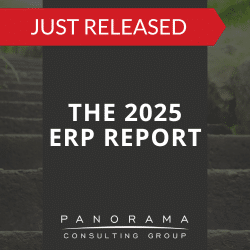An enterprise resource planning (ERP) system integrates various functions across an organization into a unified platform. This is all made possible through modules.
Modules are building blocks that come together to streamline end-to-end processes throughout an organization. They are each dedicated to a specific function.
Today, we’re exploring the various types of ERP system modules. This includes core modules, such as financial management, and specialized modules, such as business intelligence. Keep reading to explore our easy-to-navigate ERP modules list.
What is an ERP Module?
An ERP module is a software component within an ERP solution designed to handle a specific business process or function.
Each module typically focuses on a distinct area, such as finance, human resources, or supply chain management. While each module operates independently, they are all integrated within the broader system.
A modular architecture allows you to implement only the modules that are relevant to your operations. This flexibility makes modular ERP systems adaptable to the unique needs of a variety of organizations.
Another benefit is scalability. We’ve worked with many ERP vendors that offer cloud-native software that can automatically scale modules based on real-time demand. Many of our clients find this to be cost-effective as they only need to pay for the resources they use.
The 2025 Top 10 ERP Systems Report
What vendors are you considering for your ERP implementation? This list is a helpful starting point.
Are There Any Downsides?
One of the primary challenges to consider is integration complexity. As new modules are added, particularly from different vendors, ensuring seamless communication and data flow between them can be challenging. This often requires custom coding or middleware, leading to increased implementation time and costs.
Another challenge is system complexity and maintenance. As more modules are integrated, the overall system becomes more complex, which can complicate maintenance, increase the need for specialized IT skills, and potentially lead to performance issues.
Organizations need to carefully plan and manage their ERP project to maximize the benefits of a modular ERP system while minimizing potential downsides.
Six Core ERP Modules
The core modules form the backbone of the ERP system and are critical to ensuring seamless operations across the organization. Let’s explore these foundational modules:
1. Financial Management Module
The Financial Management module is one of the most common ERP modules. It includes general ledger, accounts payable, accounts receivable, budgeting, and financial reporting.
This module provides real-time visibility into a company’s financial health by tracking expenses, monitoring cash flow, and ensuring all financial data is centralized and easily accessible.
Other capabilities include:
- Regulatory Compliance: Businesses can automate compliance processes, reduce the risk of errors, and maintain accurate financial records.
- Strategic Financial Planning: Businesses can conduct strategic financial planning by using tools for forecasting, budgeting, and scenario analysis.
2. Human Resources Management (HRM) Module
The Human Resources Management module is essential for managing an organization’s workforce.
This module streamlines workforce management by centralizing employee data, automating routine HR tasks, and providing insights into workforce productivity.
In addition, the HRM module streamlines areas such as:
- Compliance and Risk Mitigation: Organizations can stay compliant by automating record-keeping and automating alerts regarding potential legal risks.
- Employee Development and Retention: Organizations can automate feedback mechanisms, create personalized learning and development plans, and more.
3. Supply Chain Management (SCM) Module
The Supply Chain Management module is designed to handle everything from procurement and inventory management to logistics and supplier relationship management.
This module helps companies optimize inventory levels to reduce carrying costs and minimize the risk of stockouts or overstock situations.
Other capabilities include:
- Procurement: Organizations can automate the creation of purchase requisitions and orders, while maintaining a centralized database of supplier information, contracts, and terms.
- Logistics and Distribution: Organizations can plan the most efficient routes and schedules for deliveries, while accessing real-time tracking of shipments.
Many of the top ERP systems for supply chain management aggregate data from various sources, including internal sales records, supply chain data, and external market analysis. This allows an organization to leverage predictive analytics for demand forecasting and use scenario analysis to anticipate how different variables might impact future demand.
4. Customer Relationship Management (CRM) Module
The CRM module plays a pivotal role in managing interactions with current and potential customers. This module covers sales, marketing, customer service, and support.
In terms of sales, this module automates everything from lead generation to order fulfillment.
In addition, the CRM module optimizes areas such as:
- Marketing Campaigns: Organizations can use customer analytics to inform targeted marketing campaigns, while executing these campaigns through automation. Campaigns can also be tracked in real time.
- Customer Service: Organizations have a holistic view of every customer, including purchase history, preferences, and previous interactions. They can also automate case management and manage customer interactions across channels.
5. Manufacturing Management Module
For companies involved in production, the Manufacturing Management module is indispensable. It manages all aspects of the manufacturing process, including production planning, scheduling, and quality control.
This module optimizes production schedules to reduce downtime and maximize output. It also integrates with other modules, such as SCM and Financial Management, to ensure that production is aligned with demand and budget constraints.
Other capabilities include:
- Quality Assurance: Companies can monitor and control product quality at every stage of the production process. They can also schedule and automate quality tests, while analyzing quality data to identify trends and root causes.
- Cost Control and Efficiency: Companies can access real-time insights into production costs and resource utilization to identify areas where efficiency can be improved and costs can be reduced.
Picture This
An industrial manufacturer might use the Manufacturing Management module to integrate real-time data from IoT sensors on the production floor. This data can be analyzed to predict equipment maintenance needs, reduce unplanned downtime, and optimize production schedules based on actual machine performance.
6. Project Management Module
The Project Management module is essential for organizations that manage complex projects, whether they are internal initiatives or client-facing projects. This module covers project planning, resource allocation, budgeting, and tracking.
In terms of resource allocation, companies can automatically schedule resources based on project needs, availability, and skill sets. They can also adjust allocations as project demands change.
In addition, the Project Management module streamlines areas such as:
- Project Tracking: Organizations have real-time visibility into project progress, enabling them to monitor performance against key milestones and make adjustments as needed.
- Risk Management: Organizations can access project analytics that identify risks and assess potential impacts.
Five Specialized ERP Modules
These specialized modules can be integrated with the core ERP system to provide a more comprehensive solution tailored to the organization’s unique requirements.
(This is just a small sampling of the types of modules available – learn more about add-on modules.)
1. Business Intelligence (BI) Module
The Business Intelligence module transforms raw data into actionable insights, empowering companies to make data-driven decisions.
This module typically includes advanced analytics capabilities, such as predictive modeling, trend analysis, and data visualization.
In addition, users can automatically generate reports and create personalized dashboards tailored to specific business needs.
Note: Implementing Business Intelligence, and other specialized modules, often requires complex integration and a high level of expertise. Before implementation, we recommend detailing which data sources the module needs access to and which metrics your company wants to track. Then, partner with a consulting firm that can help you develop a comprehensive training strategy.
2. Product Lifecycle Management (PLM) Module
The Product Lifecycle Management module is essential for managing the entire lifecycle of a product.
This module ensures that all aspects of product development are integrated, from design and engineering to manufacturing and marketing.
By providing a platform for collaboration between different departments, the PLM module fosters innovation and ensures that all stakeholders are aligned throughout the product development process.
3. Warehouse Management Module
For organizations with complex warehousing needs, the Warehouse Management module offers advanced tools for managing inventory, optimizing warehouse space, and improving order fulfillment processes.
By integrating with the Supply Chain Management module, the Warehouse Management module ensures that inventory levels are synchronized across the entire supply chain.
4. Sales and Marketing Automation Module
Sales and Marketing Automation streamlines the creation, execution, and tracking of marketing campaigns, while automating lead scoring, nurturing, and conversion processes.
By centralizing customer data, this module enables organizations to deliver personalized interactions across multiple channels, improving customer engagement and increasing conversion rates.
5. Compliance Management Module
In industries with stringent regulatory requirements, the Compliance Management module is essential for managing compliance across the organization.
This module automates the tracking of compliance requirements, enabling organizations to identify potential compliance risks early and take proactive measures to mitigate those risks.
In addition, this module provides tools for preparing for and managing audits, ensuring that all necessary documentation is readily available and that the organization can demonstrate compliance.
Learn More About ERP System Modules
Understanding the functions and benefits of different ERP modules is crucial for successful selection and implementation.
As you embark on your ERP journey, remember that the key to success lies not just in the technology itself, but in how it is integrated into your organization’s processes and culture. With the right approach, ERP modules can unlock new levels of efficiency, innovation, and growth.
Contact our ERP implementation consultants below for a free consultation.













